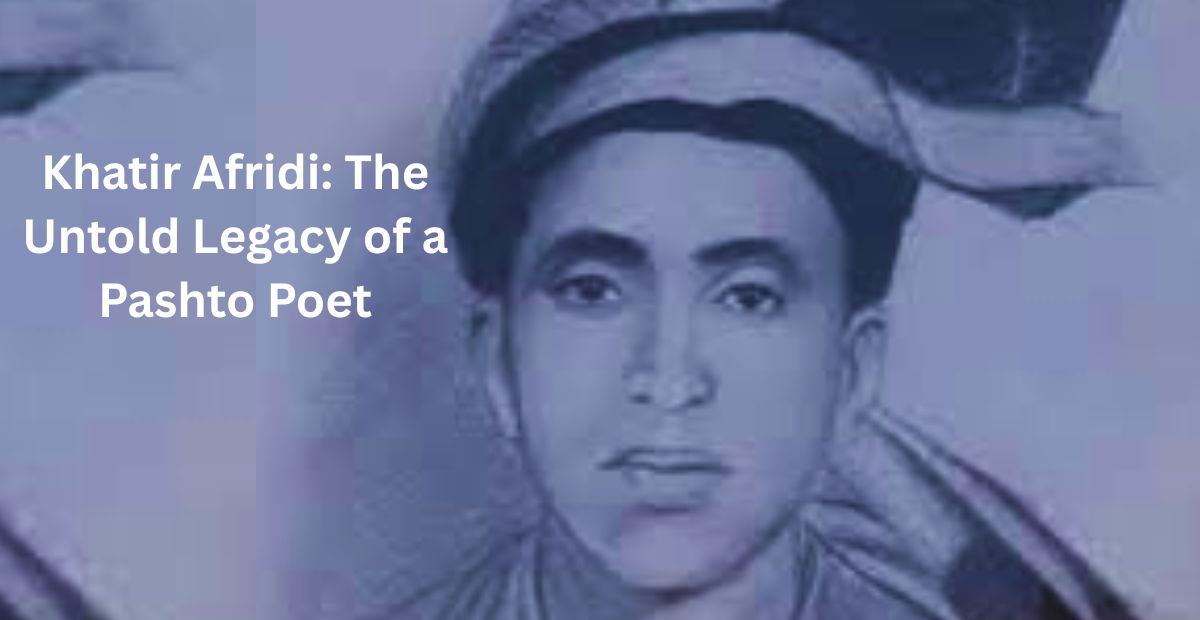Khatir Afridi, born as Meesri Khan in 1929 in the Saddu Khel village of Khyber Agency, Khyber Pakhtunkhwa, Pakistan, remains one of the most beloved and influential poets in the Pashto-speaking world. His name is etched in the hearts of people across Pakistan and Afghanistan, thanks to his evocative poetry that resonates deeply with themes of love, sorrow, and the human condition.
Early Life and Struggles
Khatir Afridi’s life was as humble as it was extraordinary. Born into the Zakha Khel tribe, he spent his childhood in the picturesque region of Landi Kotal District, Khyber. Despite his natural affinity for poetry, Afridi’s formal education was non-existent, as he never attended school. Instead, he worked as a gardener at a nearby high school, which later became an F.C. fort. His humble beginnings never stopped him from pursuing his love for poetry, and he rose to become an iconic figure in Pashto literature.
Poetry and Inspiration
Afridi’s connection to poetry was both personal and profound. He was not only a poet but a seeker of knowledge, frequently engaging with other literary figures of his time. He shared a close bond with two of the most prominent Pashto poets, Hamza Shinwari and Nazir Shinwari, who were instrumental in shaping his poetic journey. Under their guidance, Afridi honed his craft, producing poems that would go on to be celebrated for their simplicity, depth, and beauty.
His poetry became an integral part of Pashto culture. Known for writing in a straightforward yet deeply emotional style, his works touched on a variety of themes, but they were particularly admired for their reflections on life, loss, and love. Many of his songs went on to be sung by popular folk singers, creating a timeless legacy that resonated across generations.
The Struggle with Illness
Khatir Afridi’s life was not just filled with creativity but also hardship. He fought a long battle with tuberculosis, which plagued him for a decade. Despite this health battle, he continued to write and produce poems that spoke to the hearts of many. His battle with illness did not overshadow his artistic achievements but instead seemed to deepen the emotional resonance of his work. Afridi passed away at the young age of 39, leaving behind an invaluable body of work that continues to be cherished.
A Lasting Legacy
Afridi’s final resting place lies in the Saddu Khel graveyard, where a small shrine stands as a tribute to his memory. His grave is inscribed with a verse that perfectly encapsulates the essence of his poetic spirit: “Che pa qabar may tery gy Hudy da para: Lag sha mata hapa newaly za ba mar yam” — a hauntingly beautiful reflection on mortality and love. His grave has become a place of pilgrimage for admirers of his poetry, who come to pay their respects and reflect on the depth of his work.
After his death, Khatir Afridi’s son, with the help of his cousin, compiled his father’s poetry into a volume, ensuring that his legacy would live on for future generations to appreciate. His works are now widely read and studied in both Pakistan and Afghanistan, where they continue to inspire new generations of poets and readers alike.
Khatir Afridi’s Influence Today
In the years following his death, Khatir Afridi’s name has only grown in stature. His poems have become an integral part of Pashto culture, with many of his songs still being sung by folk singers in both Pakistan and Afghanistan. His poetic style is still studied by those seeking to understand the nuances of Pashto literature, and his works are a reminder of the power of words to transcend time and place.
Afridi’s poetry resonates not only for its literary merit but also for its ability to express the shared emotions of the people of the region. His themes of love, loss, and hope have made his works universally relevant, transcending borders and languages. Today, Afridi’s work is celebrated by Pashtun communities around the world, keeping his memory alive for generations to come.
Conclusion
Khatir Afridi’s life may have been short, but his legacy is nothing less than monumental. A poet without formal education, Afridi’s passion for poetry and his natural talent led him to create works that would endure for generations. His poetry continues to touch the hearts of millions, and his name remains synonymous with the soul of Pashto literature. As the world moves forward, Khatir Afridi’s words will undoubtedly continue to echo, reminding us of the enduring power of poetry to reflect the complexities of the human experience.
If you are ever in the region, a visit to Saddu Khel graveyard, where Khatir Afridi rests, is a must. There, his words and legacy live on, providing a powerful connection between the past and the present for anyone who stops to listen.
SEO Keywords:
- Khatir Afridi poetry
- Pashto poets
- Pashto literature
- Saddu Khel graveyard
- Pashto songs
- Pashto language poets
- Khatir Afridi legacy
- Pashto culture and tradition
